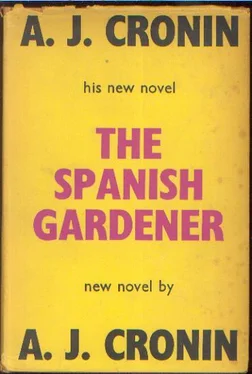Archibald Cronin - The Spanish gardener
Здесь есть возможность читать онлайн «Archibald Cronin - The Spanish gardener» весь текст электронной книги совершенно бесплатно (целиком полную версию без сокращений). В некоторых случаях можно слушать аудио, скачать через торрент в формате fb2 и присутствует краткое содержание. Жанр: Классическая проза, на английском языке. Описание произведения, (предисловие) а так же отзывы посетителей доступны на портале библиотеки ЛибКат.
- Название:The Spanish gardener
- Автор:
- Жанр:
- Год:неизвестен
- ISBN:нет данных
- Рейтинг книги:4 / 5. Голосов: 1
-
Избранное:Добавить в избранное
- Отзывы:
-
Ваша оценка:
- 80
- 1
- 2
- 3
- 4
- 5
The Spanish gardener: краткое содержание, описание и аннотация
Предлагаем к чтению аннотацию, описание, краткое содержание или предисловие (зависит от того, что написал сам автор книги «The Spanish gardener»). Если вы не нашли необходимую информацию о книге — напишите в комментариях, мы постараемся отыскать её.
The Spanish gardener — читать онлайн бесплатно полную книгу (весь текст) целиком
Ниже представлен текст книги, разбитый по страницам. Система сохранения места последней прочитанной страницы, позволяет с удобством читать онлайн бесплатно книгу «The Spanish gardener», без необходимости каждый раз заново искать на чём Вы остановились. Поставьте закладку, и сможете в любой момент перейти на страницу, на которой закончили чтение.
Интервал:
Закладка:
Nicholas had always lived in towns, in houses which gave directly on the street, and now, squatting beside José, the sun beating warmly upon the back of his neck, the smell of the earth filling his nostrils with a kind of intoxication, he told himself that he had never known anything so wonderful. Even the pricking of perspiration beneath his undershirt, normally a portentous symptom, caused him no worry at all.
Towards four o'clock the planting was finished and, with real pride, Nicholas stood beside José, viewing the neatly spaced bed which would later on bloom into lovely, vivid colour. So immersed was the little boy he did not hear the car as it entered the drive but, a minute later, he was startled by his father's voice behind him.
"Nicholas, what on earth are you doing?" The tone was surprised, tinged with disapproval.
He had jumped a little, though not much, and now he swung round with a face still lit by the joy of his achievement.
"Oh, Father, I've had such an interesting time. Watching, and helping too, with these petunias. And now they have to be watered, or they'll not thrive." He went on, coaxingly: "It isn't really late. May I just wait a moment and see them done?"
Displeased and uncertain, Brande gazed from his son to the Spanish gardener who, knowing his position, had withdrawn a few paces and was now winding the long string upon its wooden peg. Something impersonal and humble in that action seemed to reassure the Consul. His brow, which had borne a slight cloud, like a haze upon Olympus, gradually cleared. Raising his eyebrows, he answered dryly:
"Well, if you're not too long. And see you don't catch cold. Our heavy cases have arrived. I'm going in to unpack."
"Oh, thank you. Father," Nicholas exclaimed, clapping his hands. "I haven't in the least caught cold. I'll join you quite soon."
Harrington Brande turned and went indoors. Neatly arranged in the hall three wooden boxes stood awaiting him with the lids and surplus straw already removed. Garcia, he reflected, was proving even more useful than he had hoped. He stepped to the bellpull and summoned the man; then, alert for the safety of his greatest treasure, cast an exploratory eye upon the contents of the boxes. Ah, here it was—carefully, he withdrew from the smallest case a thick bundle of typescript bound with red tape.
"You rang, señor?"
Brande swung round.
"Ah, yes, Garcia. You've made an excellent beginning here. Now, will you take this. Gently, please. It is the manuscript of my book."
The butler widened his eyes.
"The señor is an author.''"
Flattered by the exclamation, with its overtones of adulation, Harrington Brande inclined his head.
"For many years now I have been occupied with a considerable work … the biography of a great man."
"Does the señor mean himself?"
Brande laughed, actually laughed, with pleasure.
"Come, come, Garcia. You go a little too far. Find some strong wrapping paper and make a neat package. I want to take it to the office. Then come back and help me with my weapons."
"Of course, señor."
When the man had gone Brande stood for a minute; then moved to the nearest crate, probing amongst the contents, wondering where he should begin. But suddenly he paused, his eye caught by a cardboard folder which lay on top of the case. His face altered. A muttered exclamation broke from his lips. The packing had been done by a firm of Havre removers, and from the recesses of some drawer they had brought to light a photograph he long ago had banished from his sight. It was the likeness of his wife.
Slowly, as though it were a snake possessing the power to strike at him, he picked up the photograph and with an expression that was strained and strangely haunted, steeled himself to look at it. Yes, there was Marian, with her pale charming face and soft dark eyes, her sensuous lips parted in that shadowy smile which had always baffled him. Still holding the photograph he sat down broodingly in the window alcove, thinking of that first fateful evening when he had met her.
It was some ten years before, at Bowdoin College, whither he had gone while on long leave from Washington, to deliver a lecture to a student's society. At the reception which followed he had observed, standing near the door, this pale, rather thin girl, dressed in black—it appeared she was in mourning for her mother—and immediately a sensation had possessed him, an overflowing emotion which, in all his exact dealings with the other sex, he had never known before. He had himself introduced, made guarded inquiries, discovered that she was poor, that her father, a superannuated university professor, lay ill of an incurable complaint in most indifferent lodgings in the town.
He then decided on a Maine vacation, found a good hotel in the vicinity and, in the most helpful manner imaginable, pressed his suit, not with much success, yet with a kind of precise tenacity. She told him she did not wish to marry. Twice she refused him, and though he went away, sore and rather sullen, for a month or two, still he came back, drawn by his passion and the steady ripening of her beauty. That winter, in February, her father died and she was alone. The opportunity was too favourable to miss. On the afternoon of the funeral, when she sat, solitary, silent, and wretched, watching the rain roll down the window panes, when her rented room, the slush and snow outside, when, indeed, all the circumstances of her life seemed more than usually dreary, she had, with a strange passive look, yielded and accepted him.
And then, what had happened? God knew that he had done his utmost to prove his love—no one could have been more devoted. He was still stationed in Washington, his prospects were bright, their hotel apartment was agreeable. To the fullest extent of his means he surrounded her with comfort, chose books and flowers for her, planned her entertainment, advised her on what people they should know, even helped her to select her dresses. He was with her everywhere, at all times—even at public functions, which he pressed her to attend, he was always at her side. And when they perforce were briefly separated, at dinner, or in the crowded reception rooms, he followed her with a deep, possessive yearning, careless of who should see how desirable, how necessary she had become to him.
She was more silent than he could have believed, and indeed these silences grew, but as he liked to talk that did not distress him. Occasionally when, at some length, he had impressed upon her his point of view, in politics perhaps, or art, or say, personal hygiene, the look in her eyes made him uncomfortable, and her shadowy smile was always baffling. But never, never could he have anticipated that evening, some months after the birth of their child, when, with colourless face and nervously averted gaze, she had asked for a separate room. It rankled still, with the bitterness of a long inflicted injury.
"Why?" he had stammered with a livid face. "Aren't you my wife.?"
She answered in a voice so low it was almost inaudible: "Sometimes I should like to belong a little to myself." Of course he had not consented. She was his lawful helpmate and he had his rights. But he had sensed then, for the first time, her aversion towards him, a strange and incredible antipathy, a barrier which grew, despite his efforts to break it down, to possess her completely, bodily and spiritually, as his own.
He was a virile man, capable surely of compelling desire, of fulfilling his part in the world of the senses. Yet how often, balanced upon the moment of final fulfillment, would he emerge suddenly from his own pleasure, shocked by the frightful knowledge that he was alone, that she lay with clenched teeth, rigid and motionless as a corpse, cast there by some icy sea.
Although in his heart he knew it to be absurd, he had been goaded to suspect that she must have a lover, had watched her jealously, had gone so far—was he not her husband? - as to set an agent to spy upon her movements. All to no purpose. Could it be, simply, that she detested him?
Читать дальшеИнтервал:
Закладка:
Похожие книги на «The Spanish gardener»
Представляем Вашему вниманию похожие книги на «The Spanish gardener» списком для выбора. Мы отобрали схожую по названию и смыслу литературу в надежде предоставить читателям больше вариантов отыскать новые, интересные, ещё непрочитанные произведения.
Обсуждение, отзывы о книге «The Spanish gardener» и просто собственные мнения читателей. Оставьте ваши комментарии, напишите, что Вы думаете о произведении, его смысле или главных героях. Укажите что конкретно понравилось, а что нет, и почему Вы так считаете.












